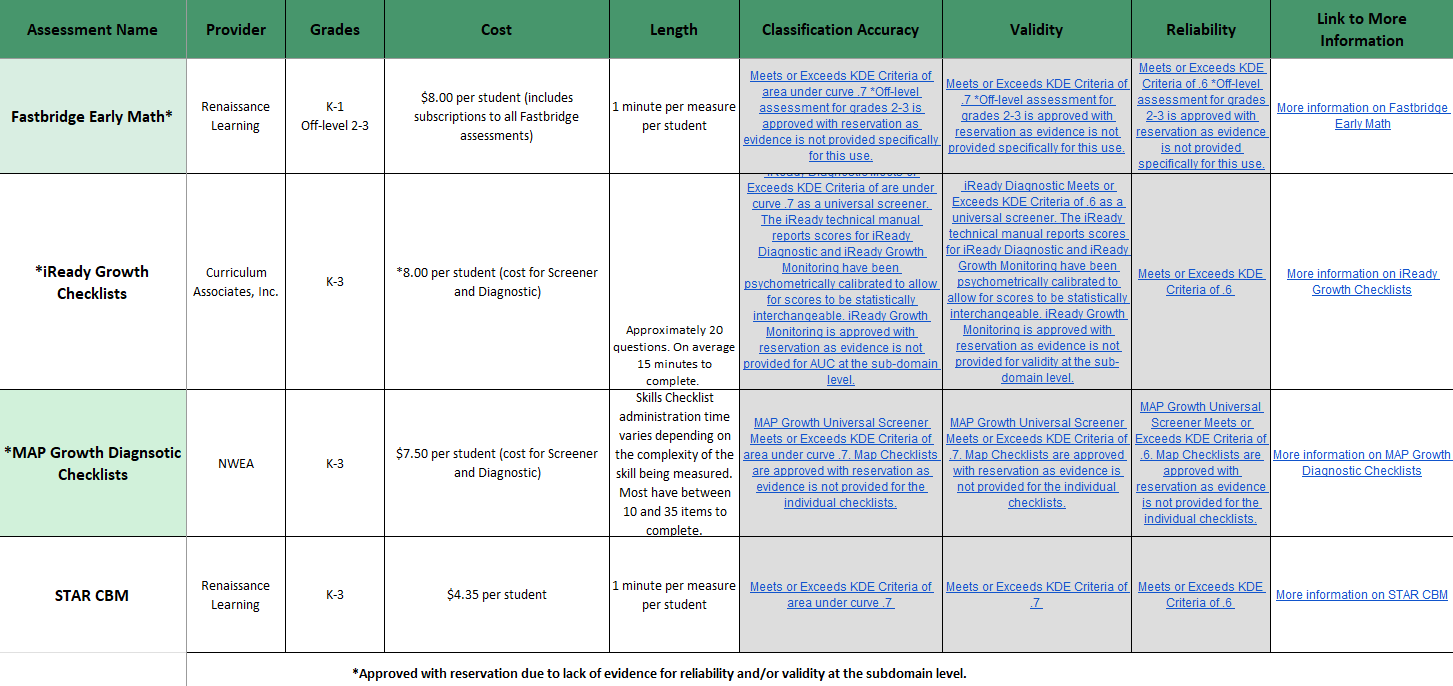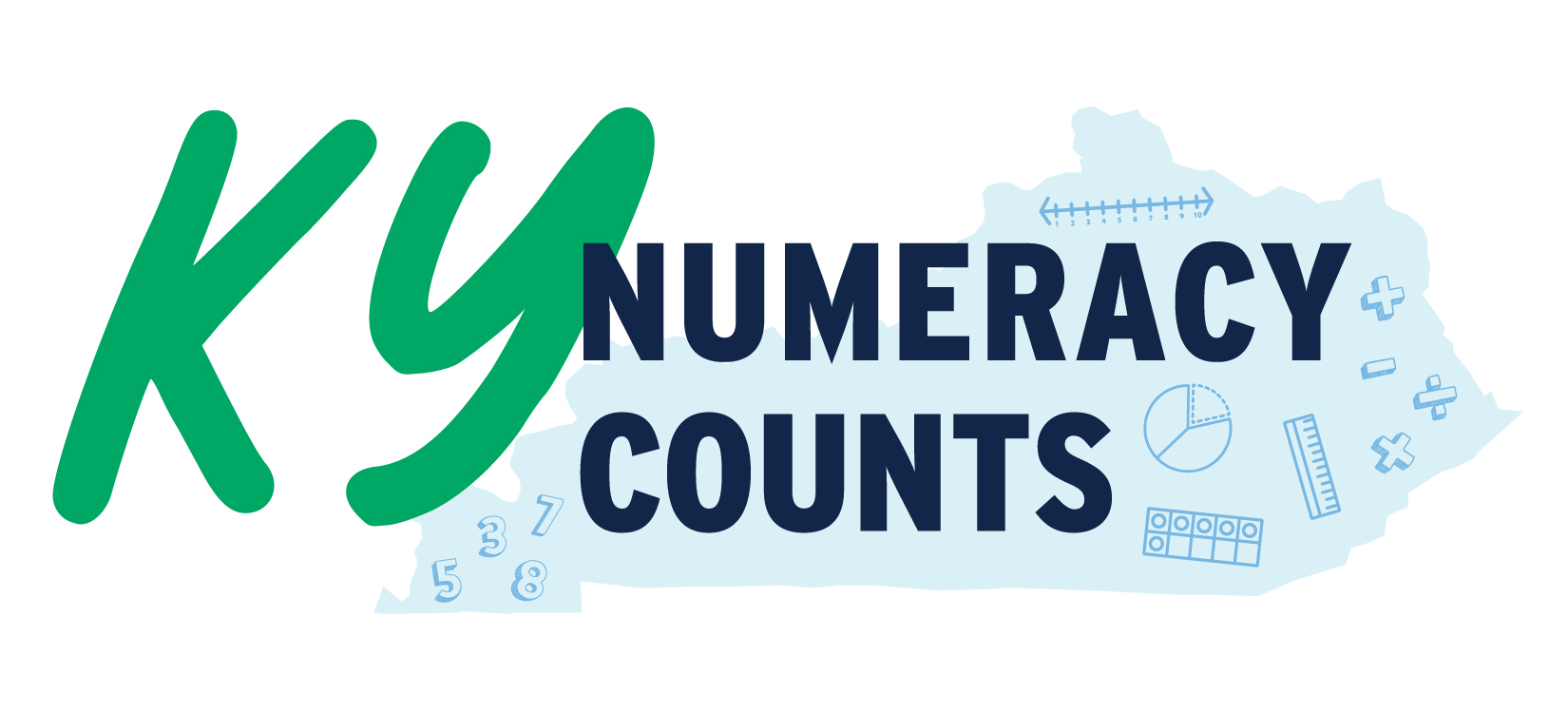Introduction
Per KRS 158.8402, as part of the Kentucky Numeracy Counts Act, by January 1, 2026, each superintendent shall:
- Select at least one universal screener for mathematics that is determined by the Kentucky Department of Education (KDE) to be valid and reliable for administration to all students in grades K-3 (5)(a);
- Select at least one diagnostic assessment for mathematics that is determined by the KDE to be valid and reliable to be administered as part of the MTSS for students in grades K-3 (5)(a);
- Ensure all teachers of students in K-3 are trained on any mathematics universal screener and diagnostic assessment selected by the superintendent prior to the administration of the assessments in the 2026-2027 school year (5)(c); and
- Adopt an evidence-based high-quality instructional resource (HQIR) for K-3 mathematics that is determined by the KDE to be reliable, valid, and aligned to the Kentucky academic standards for mathematics required by KRS 158.6453 (5)(b).
Per KRS 158.8402, beginning with the 2026-2027 school year:
- A universal screener determined by the department to be valid and reliable shall be given in the first thirty (30) calendar days of the school year to each student in kindergarten through grade three (3) at a public school or public charter school (6);
- Those students determined to be at risk for not meeting grade-level benchmarks in mathematics for kindergarten through grade three (3) based on the universal screener shall be given a mathematics diagnostic assessment determined by the department to be valid and reliable to identify the individual student deficits in numeracy and other mathematical content and practices as listed in subsection (1) of this section in the first forty-five (45) calendar days of the school year (7); and
- A mathematics improvement plan shall be developed and implemented in the first sixty (60) calendar days of the school year by a mathematics improvement team for any student in kindergarten through grade three (3) identified as needing accelerated interventions to progress toward proficient performance in mathematics (8).
Per 158.8402 (9), beginning in the 2026-2027 school year, if a student's rate of progress toward proficient performance in mathematics needs accelerated interventions as demonstrated by the results of an approved universal screener and mathematics diagnostic assessment, the local school district shall provide:
- Enrichment programs using evidence-based mathematics instruction and other strategies;
- Intensive instructional services, progress monitoring measures, and supports; and
- Parents and legal guardians of students identified for accelerated interventions in mathematics with information on how to encourage mathematics success at home.
Selection Criteria
The Kentucky Department of Education (KDE) established selection criteria to determine which assessments would be included on the final list of approved numeracy screening assessments.
Universal Screeners
Universal screening for numeracy provides an evidence-based and proactive way to monitor the effectiveness of Tier 1 math instruction and to identify students who may be at risk for developing math difficulties and in need of additional instruction or intervention. It is critical for educators to identify the potential for math difficulties in the primary grades in order to provide support early and prevent failures from accumulating over time. Universal screening provides a standardized way to quickly, efficiently and reliably predict students who may be at risk for math difficulties. Using validated screening procedures, the MTSS leadership team ensures that all students are screened with fidelity on an on-going basis, typically three times during the school year (i.e., fall, winter and spring).
Approved Universal Screeners Comparison Chart
List of Approved Numeracy Screening Assessments
Updated 2/7/25
*Note approval of a numeracy screening assessment is not an endorsement of the entire platform.
Diagnostic AssessmentsDiagnostic assessments for numeracy are used to provide more in-depth information of an individual student’s specific skills. Diagnostic assessments help teachers identify the skill deficits to effectively guide the next steps for instruction and intervention. Not all students need this type of in-depth numeracy assessment, but diagnostic data is most important for struggling and at-risk students.
An example of an appropriate use of a diagnostic instrument would be to discover which components of numeracy are deficient in a child who has performed below grade level on a universal screening assessment. In this case, it would be useful to know if the child is impaired in quantifying numbers, additive strategies, multiplicative strategies, etc.
Diagnostic assessments can be formal standardized tests or informal measures such as criterion-referenced tests and informal numeracy inventories. When used for the purpose of identifying students in need of intervention, formal and informal diagnostic assessments should be valid and reliable.
Formal diagnostic assessments (like the ones included on the approved Numeracy Diagnostic List) below provide information about the relative level of skill across the essential components of numeracy: number sense (understanding number relationships and quantities), measurement, spatial awareness, patterns recognition, basic operations (addition, subtraction, multiplication, division), interpreting data, estimation, and the ability to apply mathematical concepts to real-world situations; encompassing both understanding numbers and utilizing them effectively across different contexts.
Informal diagnostic assessments are typically obtained through administration of an informal numeracy or fluency inventory or a classroom or curriculum-based assessment. They give information at a very specific level (i.e., which part of a standard the student is struggling with, misconceptions, gaps in prior knowledge).
The formal diagnostic assessments on the approved Numeracy Diagnostic List have technical manuals that provide the evidence basis for how the assessments meet the criteria for classification accuracy, validity and reliability. Informal diagnostics may not have technical manuals in which validity and reliability data can be obtained.
Please Note: List subject to change as additional assessments are being reviewed. Assessments will be added as they are approved.
Approved Diagnostics Comparison Chart
It is suggested that districts begin their own selection process by reviewing the KDE Approved Diagnostics Comparison Chart.

List of Approved Numeracy Diagnostics
*Diagnostics with an asterisk are approved with reservation as evidence is not provided for one or more areas of the required KDE criteria.
Progress Monitoring
Progress monitoring measures are brief, repeated measures that capture students' progress or rate of improvement over time in response to instruction or intervention using valid and reliable measures (Center on Multi-Tiered System of Supports, 2021). The data provides information on whether the student is making adequate progress with the current level of support. Progress monitoring requires repeated assessment with more frequent assessment when challenges are more intense. Data is collected and graphed regularly so student progress can be compared to a goal set using the standardized decision-making process. The frequency of progress monitoring should be matched to the intensity of the instruction. For example, progress monitoring at Tier 2 is typically every two weeks or at least monthly for students identified for academic intervention and supports, and at least weekly for students identified for more intensive intervention at Tier 3.
Disclosure Statement
Reference in this website to any specific commercial products, processes, or services, or the use of any trade, firm, or corporation name is for the information and convenience of the public, and does not constitute endorsement or recommendation by the Kentucky Department of Education (KDE). The KDE is not responsible for and does not in any way guarantee the accuracy of information in other sites accessible through links herein. KDE may supplement this with other services and products that meet the specified criteria.
Questions?
Please contact us via email with any questions.
